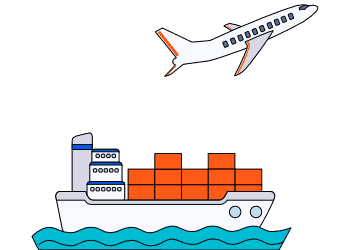Cost, Insurance, Freight Agreements: Learn the Responsibilities, Advantages, and Disadvantages of Using a CIF Shipping Agreement

Table of Contents
What does CIF stand for in Shipping Terms?
CIF is a Shipping Incoterm that stands for: Cost, Insurance, Freight agreement, with the seller holding responsibility for all three. When purchasing internationally, the seller is responsible for exporting the cargo and shipping it until they arrive at the destination port, while insuring the cargo throughout the voyage.
When shipping under CIF Incoterms, the transfer of possession beings once the goods are loaded safely onto the boat, but the seller is responsible for paying freight charges and procuring the shipping insurance. This means the seller pays for all costs associated with moving the cargo until the goods arrive at the destination port. The buyer is responsible for the import process and the costs associated with bringing the shipment through customs and delivering the products to their final destination.
CIF only applies to sea or waterway shipments, and no other forms of shipping. This shipment method is most commonly used when shipping full containers; however, it is possible to use this Incoterm on less than container loads as well.
What are the Buyers and Sellers Responsibilities with CIF Agreements?
Let’s explore the individual responsibilities for the seller and the buyer when agreeing to a sale under the CIF incoterm.
Sellers Responsibilities
When a seller is quoting CIF as their Shipping Incoterms, they agree to take on the full burden of exporting and shipping the cargo, up until the goods arrive aboard the vessel. Once the goods are safely loaded onto the boat, the buyer takes over responsibility for the shipment and assumes responsibility to import and carry the products to the final destination.
The seller holds responsibility that goes well beyond ensuring the cargo is placed on to a container ship. Their full responsibilities include:
- Export Packaging: Ensuring the cargo is adequately packaged and ready for export. In some instances, exporting countries require specific markings on their products or packaging. This party is responsible for ensuring that the cargo can be exported appropriately.
- Loading Charges: Any costs associated with loading the shipment onto the first carrier from the sellers’ warehouse.
- Delivery to Port/Place: All transportation costs associated with delivering the cargo from the seller’s warehouse to the port.
- Export Duty, Taxes & Customs Clearance: Any customs costs associated with exporting the cargo. In the event of customs examinations and additional fees, the responsibility falls on this party.
- Origin Terminal Charges: These are handing charges at the loading port.
- Loading on Carriage: Charges associated with loading the cargo onto the vessel.
- Carriage Charges: The cost of freight to move the shipment from the port of loading to the port of destination.
- Insurance: Under CIF Incoterms, the seller is responsible for obtaining insurance policy on the shipment, up until the port of destination.
Buyers Responsibilities
One the cargo is loaded onto the vessel, the seller transfers the shipment and all risks to the buyer. When the buyer is in control of the shipment, their responsibilities are as follows:
- Destination Terminal Charges: Also known as Destination Handling Charges, or DTHC, these are all costs associated with unloading to transferring the cargo within the terminal.
- Delivery to Destination: Organizing the logistics to move the cargo from the port to the final delivery destination.
- Unloading at Destination: Once the cargo arrives at the delivery destination, any costs associated with unloading the cargo for the truck.
- Import Duty, Taxes & Customs Clearance: All import requirements, including customs clearance, duty, and taxes. In the event of a customs examination or issue with the importation, this party is responsible for rectifying the problem.
Advantages and Disadvantages for the Buyer
When trading under a CIF agreement, there are significant advantages for the buyer, making the purchasing process easier. However, the disadvantages often outweigh the benefits for more experienced buyers.
Advantages
- The seller pays all costs associated with transporting and exporting the goods in the origin country. When the buyer has little experience with the origin country, and lack the necessary contacts to assist with local transportation and exportation, CIF becomes a viable option, because it allows for the seller to do the majority of the shipping that takes place outside of the destination country.
For many, this can feel advantageous, as it places little risk on the buyer. - If the buyer is unsure of the product’s export requirements, CIF obligates the seller to ensure their products can be correctly exported. This can be helpful when shipping dangerous or hazardous goods, and when purchasing in countries whose rules and regulations are not properly documented.
- In the event of an issue at sea, such as piracy, damage caused by bad weather, or Named Perlis, insurance paid for by the seller can help alleviate some of the losses.
- When a buyer has an existing relationship with a third-party logistics company that can hold handle importing and domestic shipments, CIF allows the buyer to utilize the resources they have without having to look for new resources in the origin country.
Disadvantages
- All risk is assumed once the goods are on board the carriage vessel. When an issue occurs during the shipping process, the buyer is responsible for rectifying or coping with the losses, not the seller.
- All import duties, taxes, and obligations are the buyers. Because the seller is required to procure insurance, the cost of insurance and transportation is baked into the sale price. When a buyer imports under CIF Incoterms, they are not only paying customs duty and taxes on the product price, but also on the cost of freight and insurance.
- Possibly the biggest disadvantage of CIF is when the buyer does not fully understand the terms of this agreement. Suppliers have been known to define CIF as “free shipping”. To the unfamiliar international buyer, this assumption is that the cargo will be delivered to their door when in reality, it is “free shipping to the destination port”. We’ve heard horror stories from buyers claiming the supplier stranded their cargo at the port, which led to unexpectedly high costs to the buyer.
Had the buyer understood the terms of CIF, this issue would not have occurred. - Anytime a buyer is relying on a seller to manage any aspect of the shipping process, they run the risk of inflated prices. In certain countries, kickbacks and commissions are common, which can lead to inflated shipping costs.
- Because the seller is handling the freight process, they are most likely going to select the least expensive shipping method. This inevitably leads to longer than normal shipping times, and delays caused by inefficient shipping companies.
- The buyer is responsible for paying the destination handling charges, which is not a bad thing; however, it can create an added hidden cost to the buyer, unless discussed beforehand. There are times when shipping companies who are shipping for costumers under CIF terms will inflate the destination handling charges for the buyer because this is an unavoidable cost.
- In the event of damaged cargo, you may face a difficult time getting money from your insurance claim. CIF Incoterms will usually define the beneficiary as the seller, and if your shipment is damaged, you may only find out after the container is unloaded, and you have paid the final amount to your seller. In that event, the seller completed the transaction and the insurance claim would go to the seller, not the buyer.
- Sellers may not know specific import requirements, which, if neglected, could lead to hefty fines. In the US, every importer is required to fulfill the Importer Security Filing, also known as an ISF. Since the seller is handling the shipping, they must prepare the filing on the buyer’s behalf. However, if they are unaware of this, the U.S. Customs and Border Patrol will fine the importer (the buyer) $5,000.
When to Use a CIF Agreement?
- CIF Incoterms should only be used for sea and waterway shipments.
- For those new to importing, CIF can work, as it allows them to understand the importing process before needing to understand the export process.
- But beware, the costs are always going to be significantly higher than if you arranged these services yourself, by relying on a dedicated freight fowarder to help you identify the most cost-effective way to ship your products.
CIF Agreement FAQ’s
Does CIF include duty?
No, it’s the buyer’s responsibility. CIF does not include any import duties, VAT, or taxes. It does include all export requirements. Under CIF, the seller must export and pay the costs to ship to your destination port, but you must import and pay all costs associated with the importation.
What is the difference between CIF and FOB?
CIF requires the seller to export the cargo, get the cargo loaded onto the ship, and pay the costs to ship to the destination port. FOB requires the seller only to export the cargo and load the goods onto the ship. FOB allows the buyer to have more control in the shipping process, and choose their preferred shipping company.
What is the difference between CIF and CIP?
The difference between CIF and CIP revolves around the amount of insurance the seller must obtain. CIF means cost, insurance, and freight, up to the port destination. CIP means carriage and insurance paid to the defined destination. For CIF, the seller needs to insure the cargo while aboard the ship. For CIP, they must insure the full transportation.
Can CIF Incoterms be used for small parcel shipments?
CIF can only be used for ocean shipments. The size of the parcel does not matter, nor does the type of container the cargo is being shipped by. CIF can be used for less than container load (LCL), and full container load (FCL).
Can CIF Incoterms be used for air freight?
CIF cannot be used for air freight. CIF is only designated for ocean freight and waterway shipments. Buyers and sellers wishing to use CIF for air shipments can substitute CIF for CIP, which stands for carriage insurance paid to the destination. With this Incoterm, the seller must insure the cargo to the defined destination.


